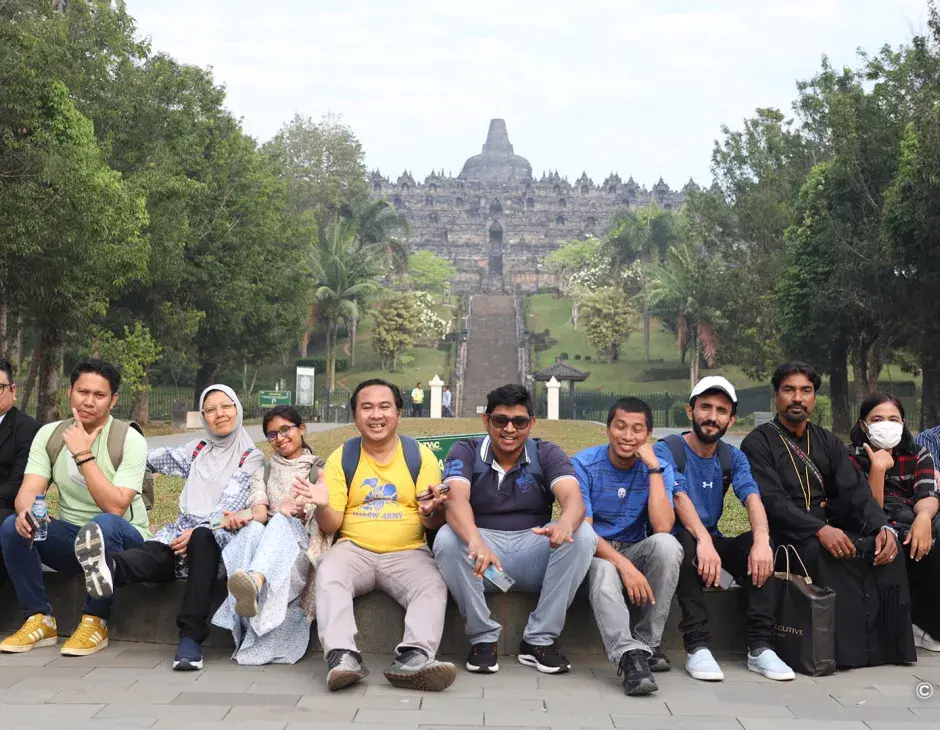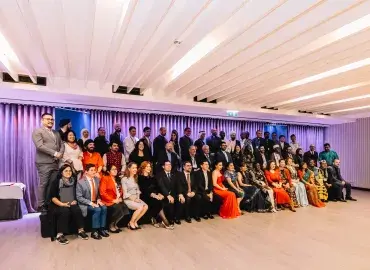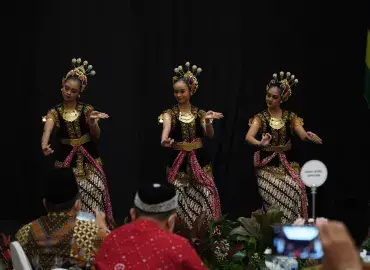"In Yogyakarta, We Are Giving Fellows a Unique Experience in the Context of Interreligious Training"
One of the most popular cities to visit in Indonesia, Yogyakarta is also known for its religious diversity.
Colloquially referred to as an “interfaith wonderland,” Yogyakarta features a majority Muslim population (82%) living alongside a robust Christian minority (17%), all living together in a city with a stunning Buddhist, Hindu, and indigenous cultural legacy.
Between 22 and 29 July, 12 KAICIID Fellows from eight countries across South and Southeast Asia gathered in Yogyakarta to learn about peacebuilding and conflict resolution, the theory and practice of interreligious dialogue, and the role of religious leaders and faith-based organisations (FBOs) in building sustainable peace.
The participants — who come from Indonesia, Pakistan, the Philippines, Thailand, Singapore, Bangladesh, and Malaysia — are taking part in KAICIID’s South and South-East Asian cohort of the Fellows Programme.
The one-year programme equips, inspires, and empowers emerging leaders and educators, bringing together leaders and educators from all corners of the world and different religious backgrounds for training in dialogue facilitation, conflict prevention, intercultural communication, and the promotion of social cohesion.
The content and the format of the training, resources, and the opportunities offered are the same in all cohorts. Thus far, KAICIID has trained over 400 Fellows from a total of 84 different countries.
A Unique Place to Learn about Dialogue First-hand
The setting for this round of capacity-building training could not be more perfect, said KAICIID’s Mike Waltner.
“Yogyakarta is a unique place,” said KAICIID’s Senior Programme Manager for the Asia Region, “and the uniqueness of this place and its institutions offers a strong anchor for our training.”
Regarded as a vital centre for the preservation of classical Javanese culture, Hindu history, and Buddhist patrimony, Yogyakarta is also renowned as a nucleus for Indonesian higher education, including the prestigious Gadjah Mada University.
A former Indonesian capital (1946-48), it is also the seat of the Yogyakarta Sultanate — a Javanese monarchy in the Republic of Indonesia, headed by Hamengkubuwono X — and features a cornucopia of religious sites and experiences that locals and visitors to enjoy.
Yogyakarta hosts the world-famous UNESCO World Heritage Borbudur complex — the largest Buddhist temple on the planet — the 9th-century Prambanan Hindu Temple and Ramayana Ballet, the Kauman Grand Mosque, and numerous Catholic shrines and Protestant churches.
These places are more than tourist attractions, however. They are also key sites for ongoing education in peacebuilding and the benefits of interreligious dialogue.
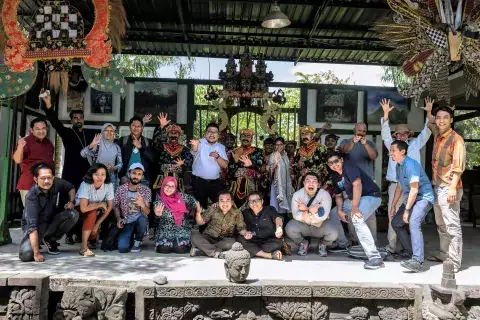
That is why KAICIID Fellows have visited several of these locations as part of their training, including the impressive 9th-century Mendut Buddhist Monastery, an Islamic Boarding School, and an interreligious & intercultural community that draws people from the local traditions of the five mountains of Central Java. Participants also met with leaders of the local indigenous communities from the Yogyakarta area for discussion and reflection.
At each site, they learn some of the “long history of Yogyakarta’s diversity,” said Waltner, “and witness first-hand the historical layering of civilizations that has made the city what it is today.”
The hope, said Waltner, is that Fellows witness, feel, and glean from these site visits how Yogyakarta has gained a reputation for tolerance and peaceful coexistence.
He said, “for some of these Fellows, it will be a first-time experience visiting some of these kinds of sites.
“Whether it’s a Buddhist temple or a Hindu devotional site, it will be introduced to them from the perspective of someone within that tradition,” said Waltner, “the lived religious aspect will be transformative.”
At the same time, Yogyakarta’s standing as a place of interreligious harmony has been hard-fought. Ongoing tensions threaten to disrupt what is otherwise internationally recognized as a paragon of tolerance.
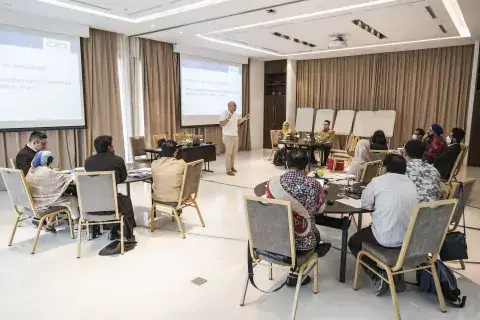
In 2018, Hamengkubuwono X called for a recommitment to preserving religious freedoms in the wake of attacks against churches and public buildings in Surabaya, a port city some four hours from Yogyakarta on the island of East Java.
Undeterred by flashes of conflict, local leaders have continually recommitted to conflict resolution and peacebuilding. The Center for Religious and Cross-Cultural Studies (CRCS) at Gadjah Mada University and the Interfaith Consortium for Religious Studies (ICRS) are just two examples of initiatives in Yogyakarta working to preserve peace.
Fellows had the opportunity to meet with representatives from both CRCS and IRCS to learn from their experience and hear about how they seek to uphold Indonesia’s national slogan Bhinneka Tunggal Ika, which means “unity in diversity.”
“By forming new friendships and partnerships with such organizations, Fellows get the opportunity to learn from practical, hands-on examples and case studies,” said Waltner.
Bridging Between Yogyakarta and Home
Wiwin Rohmawati, 2015 KAICIID Fellow and Vice Director of the Institute of Southeast Asian Islam (ISAIs) at Sunan Kalijaga State Islamic University in Yogyakarta, will be taking part in the training.
Personally appreciating the value of such training and the benefits of applying that learning in her own context, Rohmawati hopes the training will go smoothly and create a productive environment for engagement between participants.
Rohmawati said she not only hopes that “participants will improve their skills in interreligious and intercultural dialogue but build their network as well.”
In particular, she thinks “Yogyakarta’s rich cultural atmosphere” will serve as an inspiration. “Set in such a context, this training will improve the participants’ horizon of understanding diversity, tolerance, and dialogue, as well as its dynamics in a context different than their own,” she said.
The training, Waltner argued, will help participants connect Yogyakarta’s diversity to their own context and empower them to pass their transformative experiences on to people they lead, train, and teach back home.
As part of their training, each Fellow will receive technical and financial support from KAICIID to design and implement an interreligious initiative in their own context. “These Fellows are religious educators with strong proposals,” he said, “but giving them this kind of training in Yogyakarta is invaluable for helping them teach and facilitate interreligious dialogue within their own communities.”
“We held sessions to help them think strategically about the results they hope to achieve through their dialogue initiative during the training", Walter said.
The uniqueness of Yogyakarta, Waltner said, makes the possibility of success in this regard much more promising. "We are giving Fellows a unique experience in the context of interreligious training in this city", he argued.
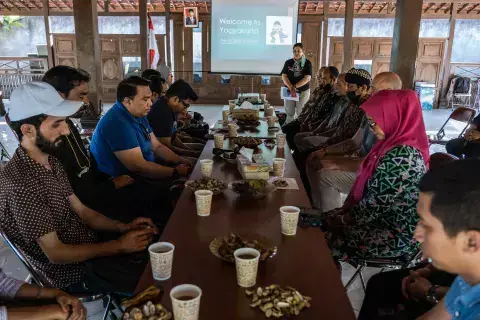
Malminderjit Singh, a Sikh Fellow from Singapore, agrees with Walter. "This is the best Fellowship I have ever participated in and I cannot think of a better classroom or a better peer group for learning about interreligious dialogue than this one", he confirmed
Graduates from KAICIID’s flagship International Fellows Programme have spoken about their year-long training and the impact it…
The importance of mainstreaming ethics education in global curricula was the focus of a series of workshops co-led by KAICIID…

The recent violent attacks in Surabaya, Indonesia, shocked us in their abuse of children who were instrumentalised to carry…

